
The Sandinista National Liberation Front is a socialist political party in Nicaragua. Its members are called Sandinistas[sandiˈnistas] in both English and Spanish. The party is named after Augusto César Sandino, who led the Nicaraguan resistance against the United States occupation of Nicaragua in the 1930s.

Ernesto Cardenal Martínez was a Nicaraguan Catholic priest, poet, and politician. He was a liberation theologian and the founder of the primitivist art community in the Solentiname Islands, where he lived for more than ten years (1965–1977). A former member of the Nicaraguan Sandinistas, he was Nicaragua's minister of culture from 1979 to 1987. He was prohibited from administering the sacraments in 1984 by Pope John Paul II, but rehabilitated by Pope Francis in 2019.
Pedro Joaquín Chamorro Cardenal was a Nicaraguan journalist and publisher. He was the editor of La Prensa, the only significant opposition newspaper to the long rule of the Somoza family. He is a 1977 laureate of the Maria Moors Cabot Prize of Columbia University in New York. He married Violeta Barrios de Chamorro, who later went on to become President of Nicaragua (1990-1996). In 1978, he was shot to death, one of the precipitating events of the overthrow of the Somoza regime the following year.
La Prensa is a Nicaraguan newspaper, with offices in the capital Managua. Its current daily circulation is placed at 42,000. Founded in 1926, in 1932 it was bought by Pedro Joaquín Chamorro Zelaya, who had become editor-in-chief. He promoted the Conservative Party of Nicaragua and became a voice of opposition to Juan Bautista Sacasa, for which the paper was censored. He continued to be critical of dictator Anastasio Somoza García, who came to power in a coup d'etat.

The Conservative Party is a conservative political party in Nicaragua. Its slogan is “Dios, Orden, Justicia”, often depicted on the three sides of a triangle.

Luis Alfonso Robelo Callejas, a Nicaraguan businessman, was the founder of the Nicaraguan Democratic Movement (MDN).
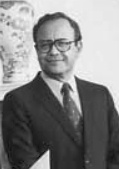
Arturo José Cruz Porras, sometimes called Arturo Cruz Sr. to distinguish him from his son, was a Nicaraguan banker and technocrat. He became prominent in politics during the Sandinista (FSLN) era. After repeatedly resigning from positions in protest, opinion divided between those who lauded him as a statesman and man of principle, and those who derided him as an ineffectual hand-wringer.
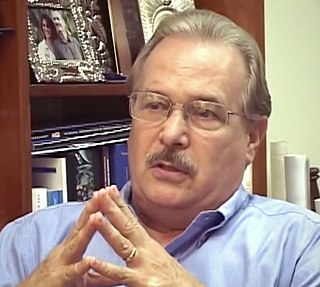
Joaquín Cuadra Lacayo, a scion of Nicaragua's elite, joined the rebel Sandinista National Liberation Front (FSLN) in late 1972. After their victory in 1979, he became army chief of staff.

José Coronel Urtecho was a Nicaraguan poet, translator, essayist, critic, narrator, playwright, diplomat and historian. He has been described as "the most influential Nicaraguan thinker of the twentieth century". After an attraction to fascism in the 1930s, he became a strong supporter of the Sandinista National Liberation Front in 1977.
The Colegio Centro América is a private Catholic school located in Managua, Nicaragua. Founded by the Jesuits in the city of Granada in 1916, the school serves as an elementary, middle, and high school. The school quickly became the preferred boarding school for children of elite families. To this day, the school is considered to be the best one in the country.
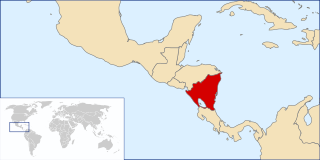
The following is an alphabetical list of topics related to the Republic of Nicaragua.
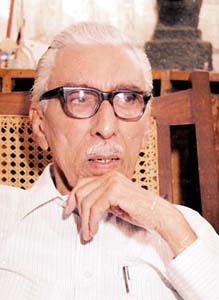
Pablo Antonio Cuadra was a Nicaraguan essayist, art and literary critic, playwright, graphic artist and one of the most famous poets of Nicaragua.
Idania de Los Angeles Fernandez Ramirez, was a Nicaraguan revolutionary.
Confidencial is a Nicaraguan weekly newspaper in Nicaragua with offices in the capital Managua. It was founded in 1996 by Carlos Fernando Chamorro Barrios, Chamorro is the former director of the Sandinista National Liberation Front newspaper Barricada and son of Pedro Joaquín Chamorro Cardenal, Nicaraguan journalist and former editor of La Prensa who was murdered in the last year of the Somoza rule, influencing public sympathy for the FSLN rebels.
In 1979, the Sandinista National Liberation Front (FSLN) overthrew Anastasio Somoza Debayle, ending the Somoza dynasty, and established a revolutionary government in Nicaragua. Following their seizure of power, the Sandinistas ruled the country first as part of a Junta of National Reconstruction. Following the resignation of centrist members from this Junta, the FSLN took exclusive power in March 1981.
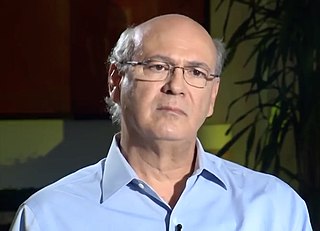
Carlos Fernando Chamorro Barrios is a Nicaraguan independent investigative journalist. He is the founder and editor of Confidencial, a news website and weekly publication combining investigative journalism and analyses of current affairs. He also hosts two television news shows, Tonight and This Week. Chamorro is the youngest son of former president of Nicaragua Violeta Barrios de Chamorro and Pedro Joaquín Chamorro Cardenal, a Nicaraguan journalist and editor of La Prensa who was shot to death in January 1978 during the Somoza regime.

Anuar Moisés Hassan Morales is a Nicaraguan politician. He was one of five members of the Junta of National Reconstruction that ruled the country from 1979 to 1984, following the fall of the Somozas regime.
Pedro Joaquín Chamorro Barrios is a Nicaraguan journalist and politician. He began his career in journalism working at La Prensa, following the 1978 assassination of its editor, his father, Pedro Joaquín Chamorro Cardenal. Working on the side of the Contras in exile in the 1980s, he returned to the country in 1989 when his mother Violeta Barrios de Chamorro ran for president, and following her election, served as a Nicaraguan ambassador. He later became defense minister. In the 21st century, Chamorro has been a city councilor for Managua and deputy in the National Assembly, also for Managua. On 25 June 2021, he became part of a wave of arrests of opposition and civic figures in Nicaragua.

Jaime Chamorro Cardenal was a Nicaraguan newspaper editor and publisher. A civil engineer by training, journalism was the family business, as his father owned the newspaper La Prensa. Chamorro joined La Prensa in 1974, where he worked for 47 years and served as publisher for 28, from 1993 until his death in 2021.











